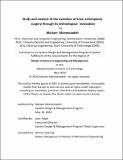Study and analysis of the evolution of knee arthroplasty surgery through its technological innovation
Author(s)
Momenzadeh, Mariam
DownloadThesis PDF (3.472Mb)
Advisor
Rubin, Joan
Terms of use
Metadata
Show full item recordAbstract
Total Knee Arthroplasty (TKA) offers life-changing improvements for many patients; however, a considerable portion of 10-15% continue to experience dissatisfaction after the surgery. Given the rise in the aging population, increased insurance eligibility for TKA in patients with milder symptoms, and growing interest in robotic surgery, it is important to identify technology gaps that can improve overall patient outcomes. This analysis aims to map the network of processes and stakeholders involved in the TKA journey, from pre-operative planning to post-operative rehabilitation. It will examine existing technologies employed
across stages of TKA, understanding their functionalities, evaluating their limitations, and assessing their impact on patient outcomes while identifying areas where investment in technology and innovation is most critical.
Through this investigation, the thesis seeks to shed light on the complexities of the TKA ecosystem, pinpointing some of its limitations and opportunities for technological advancement. This work serves as a decision-making guide, potentially empowering innovators to channel their resources toward impactful solutions that elevate both short and long-term patient outcomes following TKA surgery.
Date issued
2024-05Department
System Design and Management Program.Publisher
Massachusetts Institute of Technology